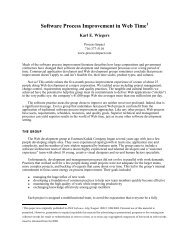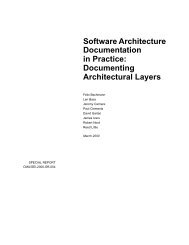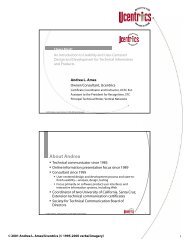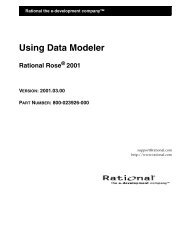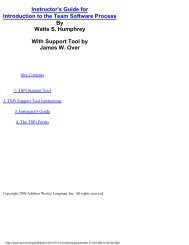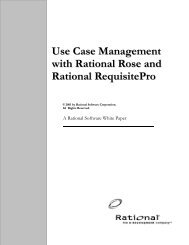RSI - A Structured Approach Use Cases and HCI Design
RSI - A Structured Approach Use Cases and HCI Design
RSI - A Structured Approach Use Cases and HCI Design
Create successful ePaper yourself
Turn your PDF publications into a flip-book with our unique Google optimized e-Paper software.
The <strong>RSI</strong> <strong>Approach</strong> To <strong>HCI</strong> <strong>Design</strong> / <strong>Use</strong> Case Analysis Page 21 of 42<br />
4.3.1. Inputs:<br />
• ad-hoc requirements or project start-up document;<br />
4.3.2. Outputs:<br />
• requirement use case summary diagram(s);<br />
• requirement use case textual descriptions<br />
• requirement use case scoping <strong>and</strong> phasing plan;<br />
• (optionally) conceptual domain object model;<br />
4.3.3. Sub-process:<br />
• Review ad-hoc requirements document with users:<br />
– identify any business processes implied by the requirements document;<br />
– add these to the c<strong>and</strong>idate requirement use case set;<br />
• Consider some or all c<strong>and</strong>idate requirement use cases in conjunction with users (if there<br />
are a very large number, some pre-requirements scoping may be necessary):<br />
– identifying the main flows;<br />
– develop exception flows asking: "what could go wrong?"; "what might vary?";<br />
– develop exception flows to exception flows in the same manner, until no further<br />
exceptions are found;<br />
– if a conceptual object model is being developed, consider the impact of the above<br />
on it;<br />
• Finalise <strong>and</strong> review all deliverables, iterating as necessary;<br />
The requirement use case model is necessarily low in detail as it is the basis upon which the<br />
project will be scoped <strong>and</strong> phased. Including more detail would lead to a great deal of wasted<br />
efforts documenting steps that may never get automated!<br />
Experience using requirement use cases on the Andersen Consulting project mentioned above<br />
suggests that the exception flow analysis is particularly useful in ensuring a complete model<br />
of the system is generated. The project also demonstrated that accurate estimates can be made<br />
at the end of this phase.<br />
4.3.4. Example - hotel reservation system - requirement use case model<br />
The worked example shown is based on the following ad-hoc requirements:<br />
Reference Problem Statement<br />
A. The guest makes a reservation.<br />
B. The hotel will take as many reservations as it has rooms available.<br />
W5a - <strong>RSI</strong> LONG PAPER [42 PAGES].doc( Rev: 5) - 03/09/00



